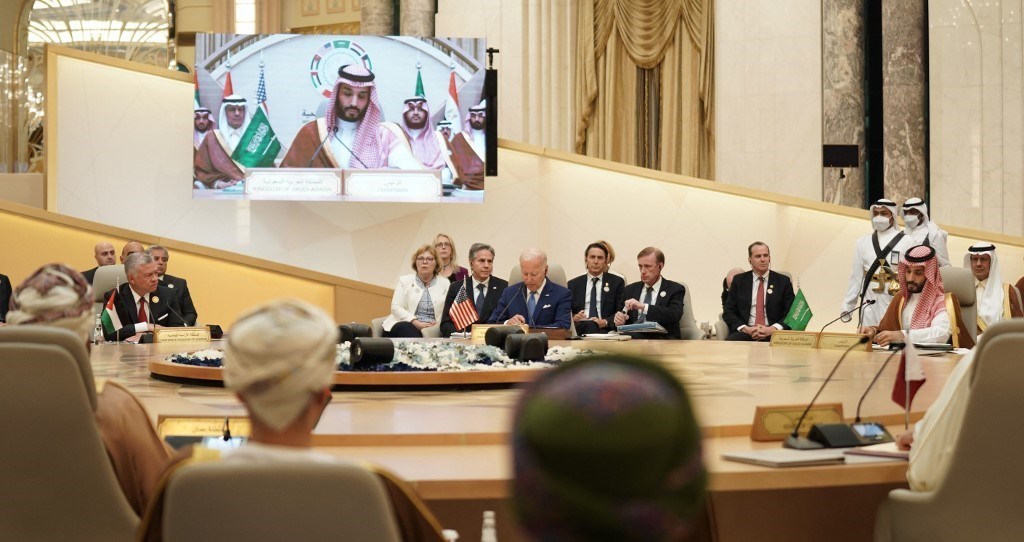Israeli journalist speaks at Jeddah summit as proof of normalization
Israeli Channel 13 correspondent says that what happened in Jeddah is a step toward the normalization of relations between Saudi Arabia and "Israel", despite Saudi denial.
-

Jeddah Summit for Security and Development
A correspondent of the Israeli Channel 13 announced, from Jeddah Summit that "despite the statements of the Saudi Foreign Minister, Faisal bin Farhan, what happened here is a step in the direction of normalization. There is no doubt about that."
Addressing the broadcaster, he added:
"Be aware that we are broadcasting live. You are talking to me and I am answering you. All this is taking place via a live broadcast, and we are located in Jeddah, in Saudi Arabia. And if you want another proof of normalization, this broadcast is allowed here."
The Saudi Foreign Minister, Faisal bin Farhan, was asked, during a press conference, about the normalization of ties with "Israel", to which he replied, "Why are you talking about normalization, (is it) because we allowed them (Israel) to fly in our airspace? We allow any country to fly in our airspace, and we also allow them, there is no need to call this normalization."
Bin Farhan argued that opening airspace is not an act of normalization, however, he did explain the framework in which such a decision came. Saudi Arabia FM also failed to mention the presence of Israeli media at the Jeddah Summit, which was broadcasted live on Israeli Channel 13.
Ibn Farhan only alleged that the opening of Saudi airspace to Israeli aircraft does not pave the way for any possible steps toward the normalization of relations with "Israel".
"This has nothing to do with diplomatic ties with Israel," Prince Faisal bin Farhan told a news conference, adding, "It's not in any way a precursor to any further steps."
The next question at the press conference came in regards to the islands of Tiran and Sanafir, and whether or not "Israel" agreed to end the work of the Multinational Force & Observers (MFO), to which Ibn Farhan also replied, "This is not normalization."
The Channel 13 correspondent said, "The Saudis are not ready to admit that it's all about normalization, but there is no doubt that there have been several normalization steps here. The best proof of this is that, by the beginning of next year, they will allow direct flights from Israel to Jeddah..."
The Jeddah Summit
In a statement on Saturday evening, Saudi Foreign Minister Faisal bin Farhan denied much of what US President Joe Biden and Israeli Prime Minister Yair Lapid remarked during their bilateral meeting, which was thought to be mainly about the normalization of relations with "Israel" and increasing oil production.
The Jeddah Summit for Security and Development kicked off this afternoon in Saudi Arabia, in the presence of Biden and leaders of the Gulf Cooperation Council, as well as Egypt, Jordan, and Iraq.
Previously Biden had told Arab leaders that the US would remain fully engaged in the Middle East and would not cede influence to other world powers. He also warned that Washington will not allow any country to create a threat to freedom of navigation in the Middle East.
"Second, the United States will not allow — will not allow foreign or regional powers to jeopardize the freedom of navigation through the Middle East’s waterways, including the Strait of Hormuz and the Bab al-Mandab," Biden said at a press conference in Jeddah, Saudi Arabia.
Besides the threat, he did express some optimism about being in the Middle East, one of the most sabotaged regions by the US in the world to which he admitted implicitly.
“Today, I am proud to be able to say that the eras of land wars in the region, wars that involved huge numbers of American forces, is not underway,” he said.
Jeddah Summit, the final stop of Biden's Middle East tour - which brought together the six members of the Gulf Cooperation Council, as well as Egypt, Jordan, and Iraq - concluded with a plea for the international community to exert strained efforts in order to achieve a peaceful solution in Ukraine.
Read more: Biden to Arab leaders: US won't 'let go' of Middle East

 4 Min Read
4 Min Read










